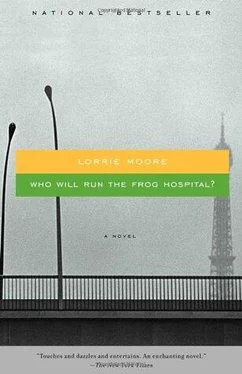“Oh, please.”
“Well, then, think of me as — what? I don’t know.”
“You know those cream puffs called Divorce?” I say now to Marguerite.
“I’ve seen them.”
“They’re so totally great. Can we get those around here?” Once, last year in Chicago, I was at a dinner party where a newlywed woman kept interrupting her husband to say in a theatrical whine, “Honey, can we get our divorce now? Now can we get our divorce?” I was the only one there who thought she was funny. I was the only one there who laughed every time. At the end of the night, she leaned forward by the door and kissed me on the lips.
“Sure! I know of a pretty good pâtisserie not far from here.” Marguerites walk is strong and loping, impossible to match. We stop at her pâtisserie , wildly order two Divorces, then sit outside at the neighboring tabac drinking panachés (half bière , half limonade ) to go with them. “Isn’t Paris amazing?” says Marguerite. “Where else would you have something like a tabac , half bar, half office supply store? The thing about France is that from romance to food to whatever, they really know what goes together. Look at all the red and purple — look at the gardens and lobbies and scarves. Not every culture knows that red and purple go so well together.” She pauses. “Of course, it’s also a totally sexist country.”
“C’est dommage,” I say, my mouth full of Divorce. I mention the men looking around, the libidinous, headlit bath the Frenchwomen are swimming in.
“The worst thing, though,” says Marguerite, “is when a man walks by you in the street, sizes you up, and says, ‘Pas mal.’ Pas mal! You feel outraged in a hundred different directions.” She pauses. “For one, you expect a little grade inflation on the streets.”
I laugh in a giddy way. I’ve eaten too much sugar. Marguerite orders water—“Château Chirac”—(a Parisian joke everyone knows, apparently, because it is scarcely acknowledged as a joke). The waiter barely cracks a smile and then goes off to the kitchen. Château Chirac is no longer funny; it is water; it is what water is called; it is what water is. And it makes me wonder how many things have begun this way, as jokes. Love, adolescence, marriage, life, death; perhaps God is looking down saying, “Geeze, y’all, lighten up. This is funny . You’re missing the into nation !”
“I can’t give my heart away to anyone but you,” Daniel said to me in the hospital. “Not that I haven’t tried, of course. It’s just that when I do, the other organs start a letter-writing campaign.”
“Don’t be clever,” I said. “Don’t be like that now.”
“What is your favorite painting in all of Paris?” I ask Marguerite. The liter of water has come and we gulp it down. She looks refreshed.
“Let me think,” she says. She names Géricault, van Gogh, Picasso.
“All the O s,” I say.
“All the O s! Actually, at the d’Orsay, there’s a pastel of Madame Monet, with the ribbons of her hat all untied. That’s probably my favorite. She’s sitting on a bright blue sofa — the most beautiful blue you’ve ever seen — and she is looking straight out of the drawing, as if to say, ‘I married a painter, and I still got this sofa.’ I like that one. Very French.”
“Do you think the Venus de Milo looks like Nicolas Cage?”
“A little,” she says, smiling. “But you’ve got to remember: even with all her handicaps and shyness, she’s lived in Paris; she’s been gazed upon by Parisians for years, so she believes — a belief as good as gold — that she’s absolutely beautiful.”
“Absolutely beautiful?”
“Cute. OK. She thinks she’s cute . She thinks she’s so goddamn cute.”
“Don’t you hate that? Even in a statue, I just hate that.”
We wander off to other galleries, where Marguerite shows me what she likes: big, broad, energetic paintings. “Sexy ones,” she says.
At a show of collages — tiny, fussy, intricate little cuttings and pastings, ink squiggles, swatches of color — I go from one to the other, slow and fascinated, but Marguerite is bored. She comes up behind me. “See, I don’t really like these,” she says. “They’re not sexual .”
I turn and look at her. “See, to me , these are totally sexual,” and then we both burst out laughing, our laughs booming in the gallery where others are whispering as if it were church.
“They’re sexual maybe — like a foot fetish is sexual,” says Marguerite.
“Exactly,” I say. “Exactement.”
Afterward we hike up to Père-Lachaise to look at Jim Morrison’s grave, where there is a constant beer party, and where so many bottle caps have been mashed and pounded into the dirt they have made what looks like a carpet of coins. Over the sound of one badly tuned guitar, strummed by a barefoot German, Marguerite tells me that what she’d really like to do is make films. She knows the film she’d like to make — stories of Algerians in 1962: how they were herded outside Paris in camps; how many of them were killed, disappeared. How even now, on the outskirts of Paris, Africans in bright ski pants work the toxic jobs, the factories and power plants, how Paris is built and running on the backs of these people, on the back of abominable history. The Nazis, well: Everyone knows about the Nazis.
There is no place to put such facts, not properly. There is only one’s own mournful horror, one’s worthless moral vanity — which can do nothing. The bad news of the world, like most bad news, has no place to go. You tack it to the bulletin board part of your heart. You say look , you say see . That is all.
“… So if this production company comes through, that is what I’d like to do, work with some of these documentary people,” says Marguerite, “and make that film.”
“Marguerite,” I say. “That’s great.” That’s great . “You must.”
From Horsehearts to Paris, I think, staring at the ceiling. Has anyone even put those two places in the same thought before?
“I’ve been thinking about our genes,” says Daniel, when I ask him how the day’s conference events went. We are in bed, and it’s hard to sleep. There are car alarms, motorcycle alarms, disco noises. A woman in the street below is singing, “Eef I ken mek eat there, all mek eat onywhere, eats op too you, New York, New York.”
“Yes,” I say.
“I mean, maybe it’s all for the best. Besides the Tay-Sachs. Look at the genes. On your side there’s diabetes and bad hearts.”
“And bad blood.”
“That’s right. Bad blood. And on my side there’s, well—”
“There’s arrogance and not listening,” I say.
“Arrogance and not listening.” He laughs in a sighing way. “Did you have a good day with Marguerite? What are you thinking about?” he asks. “Was it fun? Don’t worry. I can have this whole conversation by myself. You can just watch.”
“I really like Marguerite,” I say.
“I know you do.”
I sigh, clutch the covers up under my chin.
“That’s it? That’s all that’s on your mind?”
“Also Manon Lescaut ,” I say. Last week we saw a production of it at the Bastille.
“ Manon Lescaut ?”
“I’d like to die like that,” I say. “All my jewelry on, and singing about madness.”
“You would?”
“With all my jewelry on? Sure.” Probably, in real life, I would die in a bathrobe, the telephone cradled in my neck.
“Do I know you?” asks Daniel. “You don’t even wear jewelry.”
Читать дальше












